- Home
- Stephen R. Donaldson
Power That Preserves Page 21
Power That Preserves Read online
Page 21
And he was tired. He had already traveled all night, had not slept since the previous afternoon. Only four days had passed since his summoning. As he labored to keep up the pace, he found that he lacked the strength of concentration to think.
Lena was in no better condition. Although she was healthier than he, she was old, and not hardened to walking. Gradually he became as worried about her as he was weary himself. When she began to droop against him, he told Bannor flatly that he would have to rest.
They slept until midafternoon, then traveled late into the night before camping again. And the next morning, they were on their way before dawn. But Covenant and Lena did better now. The food which the Ramen gave them was hot and nourishing. And soon after gray dim day had shambled into the laden air, they reached the edge of the hills, came in sight of the Plains of Ra. At this point, they swung northward, staying in the rumbled terrain of the hills-edge rather than venturing into the bleak, winter-bitten openness of the Plains. But still they found the going easier. In time, Covenant recovered enough to begin asking questions.
As usual, he had trouble talking to Bannor. The Bloodguard’s unbreachable dispassion daunted him, often made him malicious or angry through simple frustration; such reticence seemed outrageously immune from judgment—the antithesis of leprosy. Now all the Bloodguard had abandoned the Lords, Revelstone, death refusal. Lord’s Keep would fall without them. And yet Bannor was here, living and working with the Ramen. When Covenant tried to ask questions, he felt that he no longer knew the man to whom he spoke.
Bannor met his first tentative inquiries by introducing Covenant to the Ramen—Manethrall Kam, and his Cords, Whane, Lal, and Puhl—and by assuring him that they would reach their destination by evening the next day. He explained that this band of Ramen was a scouting patrol responsible for detecting marauders along the western marge of Ra; they had found Covenant and his companions by chance rather than design. When Covenant asked about Rue, the Manethrall who had brought word of Fleshharrower’s army to Revelstone seven years ago, Bannor replied flatly that she had died soon after her return home. But after that, Covenant had to wrestle for what he wanted to know.
At last he could find no graceful way to frame his question. “You left the Lords,” he rasped awkwardly. “Why are you here?”
“The Vow was broken. How could we remain?”
“They need you. They couldn’t need you more.”
“Ur-Lord, I say to you that the Vow was broken. Many things were
broken. You were present. We could not—ur-Lord, I am old now. I, Bannor, First Mark of the Bloodguard. I require sleep and hot food. Though I was bred for mountains, this cold penetrates my bones. I am no fit server for Revelstone—no, nor for the Lords, though they do not equal High Lord Kevin who went before them.”
“Then why are you here? Why didn’t you just go home and forget it?”
Foamfollower winced at Covenant’s tone, but Bannor replied evenly, “That was my purpose—when I departed Lord’s Keep. But I found I could not forget. I had ridden too many Ranyhyn. At night I saw them—in my dreams they ran like clear skies and cleanliness. Have you not beheld them? Without Vows or defiance of death, they surpassed the faith of the Bloodguard. Therefore I returned.”
“Just because you were addicted to Ranyhyn? You let the Lords and Revelstone and all go to hell and blood, but you came here because you couldn’t give up riding Ranyhyn?”
“I do not ride.”
Covenant stared at him.
“I have come to share the work of the Ramen. A few of the Haruchai—I know not how many—a few felt as I did. We had known Kevin in the youth of his glory, and could not forget. Terrel is here, and Runnik. There are others. We teach our skills to the Ramen, and learn from them the tending of the great horses. Perhaps we will learn to make peace with our failure before we die.”
Make peace, Covenant groaned. Bannor! The very simplicity of the Bloodguard’s explanation dismayed him. So all those centuries of untainted and sleepless service came to this.
He asked Bannor no more questions; he was afraid of the answers.
For the rest of that day, he fell out of touch with his purpose. Despite the concern and companionship of Foamfollower and Lena, he walked between them in morose separateness. Bannor’s words had numbed his heart. And he slept that night on his back with his eyes upward, as if he did not believe that he would ever see the sun again.
But the next morning he remembered. Shortly after dawn, Manethrall Kam’s party met another Cord. The man was on his way to the edge of the Plains, and in his hands he carried two small bouquets of yellow flowers. The gray wind made their frail petals flutter pathetically. After saluting Manethrall Kam, he strode out into the open, shouted shrilly against the wind in a language Covenant could not understand. He repeated his shout, then waited with his hands extended as if he were offering flowers to the wind.
Shortly out of the shelter of a frozen gully came two Ranyhyn, a stallion and a mare. The stallion’s chest was scored with fresh claw-marks, and the mare had a broken, hollow look, as if she had just lost her foal. Both were as gaunt as skeletons; hunger had carved the pride from their shoulders and haunches, exposed their ribs, given their emaciated muscles an abject starkness. They hardly seemed able to hold up their heads. But they nickered to the Cord. With a stumbling gait, they trotted forward, and began at once to eat the flowers he offered to them. In three bites the food was gone. He hugged them quickly, then turned away with tears in his eyes.
Without a word, Manethrall Kam gave the Cord the bedraggled circlet from his hair, so that each of the Ranyhyn could have one more bite. “That is amanibhavam, the healing grass of Ra,” he explained stiffly to Covenant. “It is a hardy grass, not so easily daunted by this winter as the Render might wish. It will keep life in them—for another day.” As he spoke, he glared redly into Covenant’s face, as if the misery of these two horses were the Unbeliever’s doing. With a brusque nod toward the Cord feeding the Ranyhyn, he went on: “He walked ten leagues today to bring even this much food to them.” The haunted erosion filled his face; he looked like the victim of a curse. Painfully he turned and strode away again northward, along the edges of the Plains.
Covenant remembered; he had no trouble remembering his purpose now. When he followed the Manethrall, he walked as if he were fighting the deadness of his feet with outrage.
In the course of that day, he saw a few more Ranyhyn. Two were uninjured, but all were gaunt, weak, humbled. All had gone a long way down the road toward starvation.
The sight of them wore heavily upon Lena. There was no confusion in the way she perceived them, no distortion or inaccuracy. Such vision consumed her. As time passed, her eyes sank back under her brows, as if they were trying to hide in her skull, and dark circles like bruises grew around the orbs. She stared brittlely about her as if even Covenant were dim in her gaze—as if she beheld nothing but the protruding ribs and fleshless limbs of Ranyhyn.
Covenant held her arm as they walked, guided and supported her as best he could. Weariness gradually became irrelevant to him; even the keen wind, flaying straight toward him across the Plains, seemed to lose its importance. He stamped along behind Kam like a wild prophet, come to forge the Ramen to his will.
They reached the outposts of Kam’s destination by midafternoon. Ahead of them, two Cords abruptly stepped out of a barren copse of wattle, and saluted Manethrall Kam in the Ramen fashion, with their hands raised on either side of their heads and their palms open, weaponless. Kam returned the bow, spoke to the two briefly in a low, aspirated tongue, then motioned for Covenant, Lena, and Foamfollower to continue on with him. As they moved back into the hills, he told them, “My Cords were able to summon only three other Manethralls. But four will be enough.”
“Enough?” Covenant asked.
“The Ramen will accept a judgment made by four Manethralls.”
Covenant met Kam’s glare squarely. A moment later, the Manethrall turned away with a
n oddly daunted air, as if he had remembered that Covenant’s claim on him came from the Ranyhyn. Hurrying now, he led his company upward with the gray wind cutting at their backs.
They climbed across two steep bluffs which gave them a panoramic view of the Plains. The hard open ground lay ruined below them, scorched with winter and gray snow until it looked maimed and lifeless. But Manethrall Kam moved rapidly onward, ignoring the sight. He took his companions past the bluffs down into a valley cunningly hidden among rough knolls and hilltops. This valley was largely sheltered from the wind, and faint, cultivated patches of unripe amanibhavam grew on its sides. Now Covenant remembered what he had heard about amanibhavam during his previous visit to the Plains of Ra. This grass, which held such a rare power of healing for horses, was poisonous to humans.
Aside from the grass, the valley contained nothing but three dead copses leaning at various points against the steepest of the slopes. Manethrall Kam walked directly toward the thickest one. As he approached, four Cords stepped out of the wood to meet him. They had a tense, frail air about them which made Covenant notice how young they were; even the two older girls seemed to have had their Cording thrust unready upon them. They saluted Kam nervously, and when he had returned their bow, they moved aside to let him enter the copse.
Covenant followed Bannor into the wood and found that at its back was a narrow rift in the hillside. The rift did not close, but its upper reaches were so crooked that Covenant could not see out the top. Under his feet, a layer of damp, dead leaves muffled his steps; he passed in silence like a shadow between the cold stone walls. A smell of musty age filled his nostrils, as if the packed leaves had been rotting in the rift for generations; and despite their wetness, he felt dim warmth radiating from them. No one spoke. Gripping Lena’s chill fingers in his numb hand, he moved behind Banner as the cleft bent irregularly from side to side on its way through the rock.
Then Manethrall Kam stopped. When Covenant caught up with him, he said softly, “We now enter the secret places of a Ramen covert. Be warned, Ringthane. If we are not taught to trust you and your companions, you will not leave this place. In all the Plains of Ra and the surrounding hills, this is the last covert.
“At one time, the Ramen held several such hidden places of refuge. In them the Manethralls tended the grievous wounds of the Ranyhyn and trained Cords in the secret rites of their Maneing. But one by one in turn each covert”—Kam fixed Covenant with a demon-ridden gaze—“has been betrayed. Though we have preserved them with our utterest skill, kresh—ur-viles—Cavewights—ill flesh in every shape—all have found our hidden coverts and ravaged them.” He studied the Ringthane as if he were searching for some sign which would brand Covenant as the betrayer. “We will hold you here—we will kill your companions—rather than permit treachery to this place.”
Without allowing Covenant time to reply, he turned on his heel and stalked around another bend in the cleft.
Covenant followed, scowling stormily. Beyond the bend, he found himself in a large chamber. The air was dim, but he could see well enough to discern several Ranyhyn standing against the walls. They were eating scant bundles of grass, and in this closed space the sharp aroma of the amanibhavam made his head ring. All of them were injured—some so severely that they could hardly stand. One had lost the side of its face in a fight, another still bled from a cruel fretwork of claw-marks in its flanks, and two others had broken legs which hung limply, with excruciating bone-splinters tearing the skin.
As he stared gauntly at them, they became aware of him. A restless movement passed through them, and their heads came up painfully, turning soft, miserable eyes toward him. For a long moment, they looked at him as if they should have been afraid but were too badly hurt for fear. Then, in agony, even the horses with broken legs tried to rear.
“Stop it. Stop.” Covenant hardly knew that he was moaning aloud. His hands flinched in front of his face, trying to ward off an abominable vision. “I can’t stand it.”
Firmly Bannor took his arm and drew him past the chamber into another passage through the rock.
After a few steps, his legs failed him. But Bannor gripped him, bore him up. Clutching with useless fingers at the Bloodguard’s shoulders, he pulled himself around until he was facing Bannor. “Why?” he panted into Bannor’s flat visage. “Why did they do that?”
Banner’s face and voice revealed nothing. “You are the Ringthane. They have made promises to you.”
“Promises.” Covenant rubbed a hand over his eyes. The promises of the Ranyhyn limped across his memory. “Hell and blood.” With an effort, he pushed away from Bannor. Bracing himself against the wall of the crevice, he clenched his trembling fists as if he were trying to squeeze steadiness out of them. His fingers ached for the Despiser’s throat. “They should be killed!” he raged thickly. “They should be put out of their misery! How can you be so cruel?”
Manethrall Kam spat, “Is that how it is done in your world, Ringthane?”
But Bannor replied evenly, “They are the Ranyhyn. Do not presume to offer them kindness. How can any human decide the choices of death and pain for them?”
At this, Foamfollower reached out and touched Bannor’s shoulder in a gesture of respect.
Covenant’s jaw muscles jumped as he bit his shouts into silence. He followed the Giant’s gesture, turned, and looked grayly up at Foamfollower. Both the Giant and Bannor had witnessed his bargain with the Ranyhyn forty-seven years ago, when the great horses had first reared to him; Bannor and Foamfollower and Mhoram and Quaan might be the last remaining survivors of the Quest for the Staff of Law. But they were enough. They could accuse him. The Ramen could accuse him. He still did not know all the things of which they could accuse him.
His wedding band hung loosely on his ring finger; he had lost weight, and the white gold dangled as if it were meaningless. He needed its power. Without power, he was afraid to guess at the things which were being kept from him.
Abruptly he stepped up to Kam, jabbed the Manethrall’s chest with one stiff finger. “By hell,” he muttered into Kam’s glare, “if you’re only doing this out of pride, I hope you rot for it. You could have taken them south into the mountains—you could have saved them from this. Pride isn’t a good enough excuse.”
Again the ghoul-begotten hurt darkened Kam’s gaze. “It is not pride,” he said softly. “The Ranyhyn do not choose to go.”
Without wanting to, Covenant believed him. He could not doubt what he saw in the Manethrall. He drew back, straightened his shoulders, took a deep breath. “Then you’d better help me. Trust me whether you want to or not. I hate Foul just as much as you do.”
“That may be,” Kam replied, recovering his severity. “We will not contradict the Ranyhyn concerning you. I saw—I would not have believed if I had not seen. To rear! Hurt as they are! You need not fear us. But your companions are another matter. The woman”—he made an effort to speak calmly—“I do not distrust. Her love for the Manes is in her face. But this Giant—he must prove himself.”
“I hear you, Manethrall,” said Foamfollower quietly. “I will respect your distrust as best I can.”
Kam met the Giant’s look, then glanced over at Bannor. The Bloodguard shrugged impassively. Kam nodded and led the way farther down the cleft.
Before following, Covenant regained his grip on Lena’s hand. She did not raise her head, and in the gloom he could see nothing of her eyes but the bruises under them. “Be brave,” he said as gently as he could. “Maybe it won’t all be this bad.” She made no response, but when he drew her forward she did not resist. He kept her at his side, and soon they stepped together out the far end of the passage.
The cleft opened into a hidden valley which seemed spacious after the constriction of its approach. Over a flat floor of packed dirt the sheer walls rose ruggedly to a narrow swath of evening sky. The valley itself was long and deep; its crooked length formed a vague S, ending in another crevice in the hills. Battered rock pillars and piles s
tood against the walls in several places, and in the corners and crannies around these immense stones, sheltered from any snowfall through the open roof, were Ramen tents—the nomadic homes of individual families. They seemed pitifully few in the canyon.
Manethrall Kam had announced himself with a shout as he entered the valley, and when Covenant and Lena caught up with him, dozens of Ramen were already moving toward them from the tents. Covenant was struck by how much they all shared Kam’s haunted air. In sharp contrast to the Ranyhyn, they were not ill-fed. The Ramen were renowned for their skill as hunters, and clearly they were better able to provide meat for themselves than grass for the horses. Nevertheless they were suffering. Every one of them who was not either a child or infirm wore the apparel of a Cord, though even Covenant’s untrained and superficial eyes could see how unready some were for the work and risk of being Cords. This fact confirmed his earlier guess that the Ramen population had been dangerously reduced, by winter or war. And they all had Kam’s driven, sleepless aspect, as if they could not rest because their dreams were fraught with horror.
Now Covenant knew intuitively what it was. All of them, even the children, were haunted by the bloody visage of Ranyhyn extermination. They were afraid that the meaning, the reason, of their entire race would soon be eradicated utterly from the Land. The Ramen had always lived for the Ranyhyn, and now they believed they would only survive long enough to see the last Ranyhyn slaughtered. As long as the great horses refused to leave the Plains, the Ramen were helpless to prevent that end.
Only their stubborn, fighting pride kept them from despair.

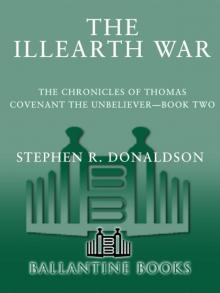 The Illearth War
The Illearth War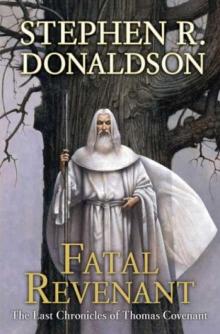 Last Chronicles of Thomas Covenant 02 - Fatal Revenant
Last Chronicles of Thomas Covenant 02 - Fatal Revenant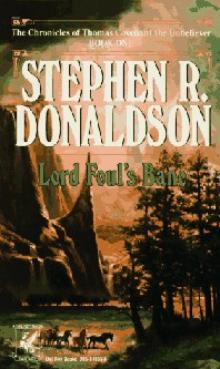 Lord Foul's Bane
Lord Foul's Bane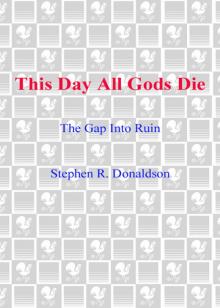 The Gap Into Ruin: This Day All Gods Die
The Gap Into Ruin: This Day All Gods Die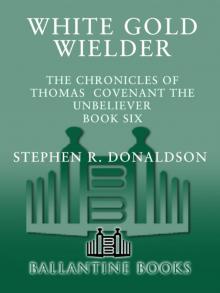 White Gold Wielder
White Gold Wielder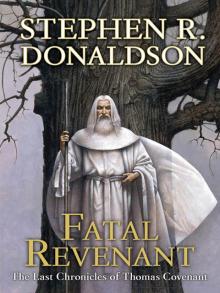 Fatal Revenant
Fatal Revenant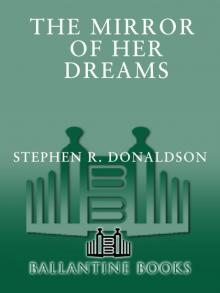 The Mirror of Her Dreams
The Mirror of Her Dreams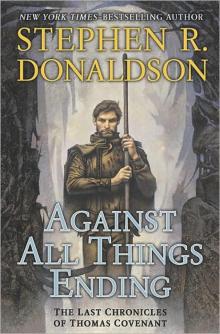 Against All Things Ending
Against All Things Ending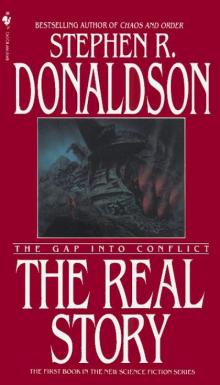 The Real Story: The Gap Into Conflict
The Real Story: The Gap Into Conflict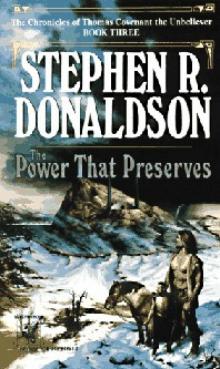 The Power That Preserves
The Power That Preserves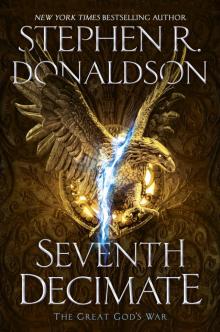 Seventh Decimate
Seventh Decimate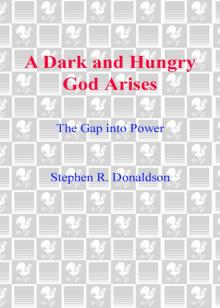 The Gap Into Power: A Dark and Hungry God Arises
The Gap Into Power: A Dark and Hungry God Arises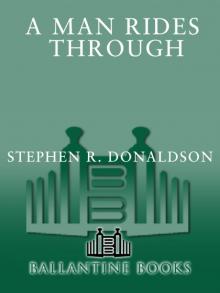 A Man Rides Through
A Man Rides Through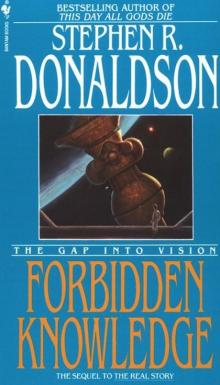 The Gap Into Vision: Forbidden Knowledge
The Gap Into Vision: Forbidden Knowledge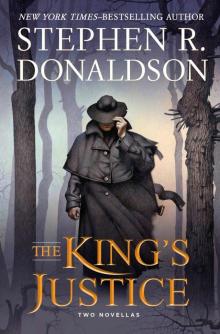 The King's Justice: Two Novellas
The King's Justice: Two Novellas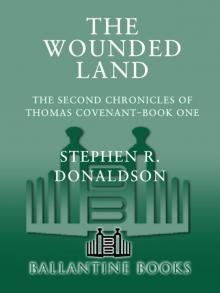 The Wounded Land
The Wounded Land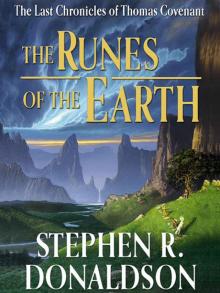 The Runes of the Earth
The Runes of the Earth Mordant's Need
Mordant's Need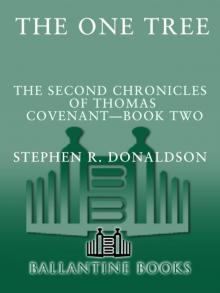 The One Tree
The One Tree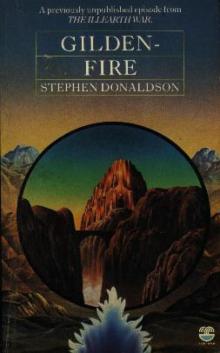 Gilden-Fire
Gilden-Fire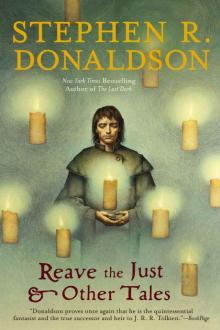 Reave the Just and Other Tales
Reave the Just and Other Tales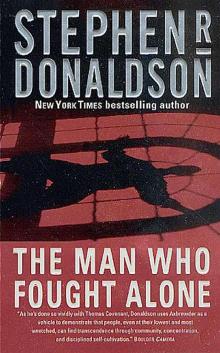 The Man Who Fought Alone
The Man Who Fought Alone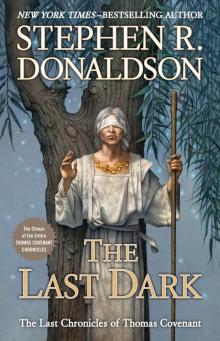 The Last Dark
The Last Dark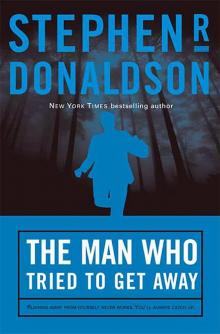 The Man Who Tried to Get Away
The Man Who Tried to Get Away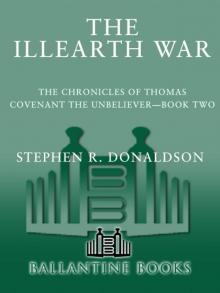 Thomas Covenant 02: The Illearth War
Thomas Covenant 02: The Illearth War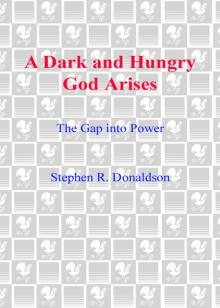 A Dark and Hungry God Arises
A Dark and Hungry God Arises The One Tree t2cotc-2
The One Tree t2cotc-2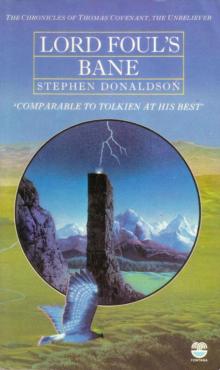 Lord Foul's Bane cotc-1
Lord Foul's Bane cotc-1 The Illearth War t1cotc-2
The Illearth War t1cotc-2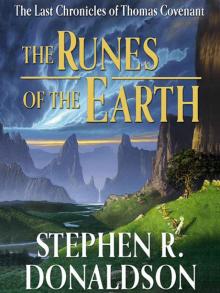 The Runes of the Earth: The Last Chronicles of Thomas Covenant - Book One
The Runes of the Earth: The Last Chronicles of Thomas Covenant - Book One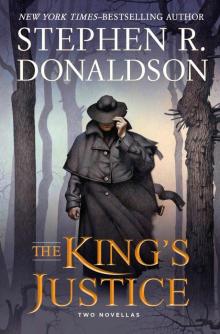 The King's Justice
The King's Justice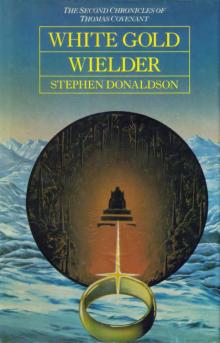 White Gold Wielder t2cotc-3
White Gold Wielder t2cotc-3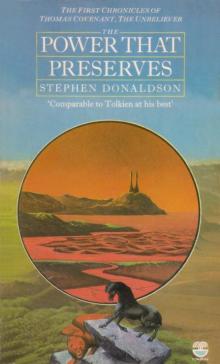 The Power That Preserves t1cotc-3
The Power That Preserves t1cotc-3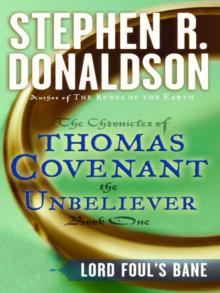 Thomas Covenant 01: Lord Foul's Bane
Thomas Covenant 01: Lord Foul's Bane Chaos and Order: The Gap Into Madness
Chaos and Order: The Gap Into Madness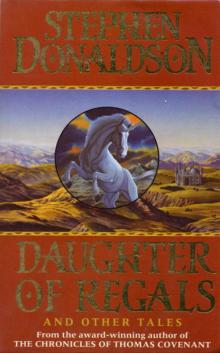 Daughter of Regals
Daughter of Regals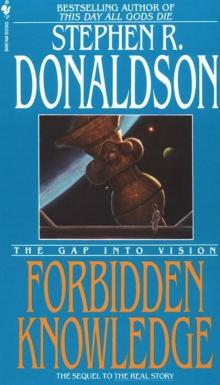 Forbidden Knowledge: The Gap Into Vision
Forbidden Knowledge: The Gap Into Vision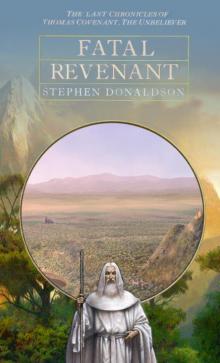 Fatal Revenant t3cotc-2
Fatal Revenant t3cotc-2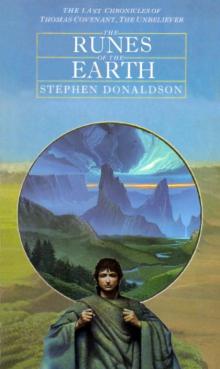 The Runes of the Earth t3cotc-1
The Runes of the Earth t3cotc-1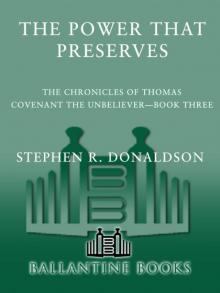 Thomas Covenant 03: Power That Preserves
Thomas Covenant 03: Power That Preserves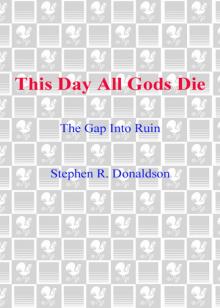 This Day all Gods Die: The Gap into Ruin
This Day all Gods Die: The Gap into Ruin The Wounded Land t2cotc-1
The Wounded Land t2cotc-1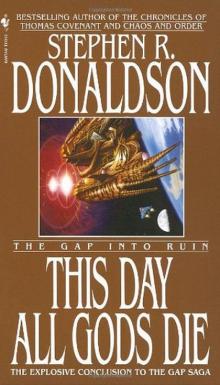 This Day All Gods Die
This Day All Gods Die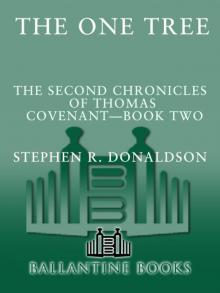 One Tree
One Tree